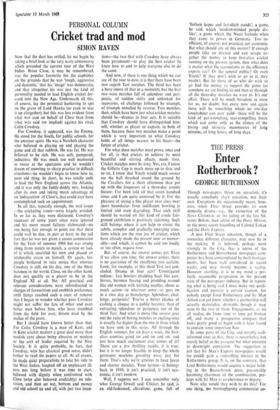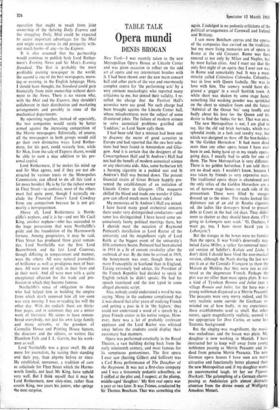Enter Rotherbrook ?
THE PRESS GEORGE HUTCHINSON
Though newspapers thrive on sensation, it's usually somebody else's sensation, not their own. Exceptions do occasionally occur, how- ever, when Fleet Street provides its own domestic drama—e.g., the extinction of the News Chronicle, or the jailing of the late Sil- vester Bolam, then editor of the Daily Mirror, or the more recent hounding of Colonel Lohin and the Daily Express.
A new Fleet Street sensation, though of a somewhat different character, may now be in the making. It is believed, perhaps most strongly in the City, that a union of the Rothermere and Beaverbrook newspaper com- panies has been contemplated by both manage- ments, has been well considered in recent weeks, and may shortly become a reality. However startling, it is to my mind a per- fectly reasonable proposition in the present state of the newspaper industry. But in report- ing what is being said I must make one quali- fication and exercise a certain caution, for nobody except Lord Rothermere and Sir Max Aitken can yet know whether a partnership will actually materialise, desirable though it may seem to the two of them. Engagements, as we all realise, do from time to time get broken off, and many a prospective compact that looks pretty good to begin with is later found to contain some important flaw.
In some parts of the City, and notably well- informed ones at that, there is nevertheless not merely belief in the prospect but what amounts to downright conviction. The suggestion is not that Sir Max's Express newspapers would (or could) gain a controlling interest in the Rothermere group. It is, on the contrary, that Lord Rothermere would acquire a major hold- ing in the Beaverbrook press, presumably becoming chairman of the combination, per- haps with Sir Max as co-chairman or deputy.
Now why would they wish to do this? For one thing, the thoroughgoing commercial co-
operation that ought to result from joint ownership of the thriving Daily Express and the struggling Daily Mail could be expected to secure important advantages for the Mail and might even restore its old prosperity with- out much harm—if any—to the Express.
It is also assumed that the partnership would continue to publish both Lord Rother- ' Mere's Evening News and Sir Max's Evening Standard. The first is probably the most profitable evening newspaper in the world; the second is one of the best newspapers, morn- ing or evening, in the English language. Here, I should have thought, the Standard could gain financially from joint ownership without detri- ment to the News. There is no reason why, with the Mail and the Express, they shouldn't collaborate in their distribution and marketing arrangements and possibly in some of the mechanical departments.
By operating together, instead of separately, the two companies would surely 'be better armed against the increasing competition of the Mirror newspapers. Editorially, of course, all the newspapers in both groups would still go their own distinctive ways. Lord Rother- mere, for his part, could scarcely lose, while Sir Max, from the sale of Express shares, would be able to earn a nice addition to his per- sonal capital.
Lord Rothermere, if he makes his mind up and Sir Max agrees, and if they are not ob- structed by various trusts or the Monopolies Commission, can afford to do all this (and a lot more besides). He is by far the richest owner in Fleet Street—in contrast, most of the others must feel quite poor, though I naturally ex- clude the Financial Times's Lord Cowdray from any comparison because he is not pri- marily a newspaperman.
Above all, Lord Rothermere is North- cliffe's nephew, and it is he—and not Mr Cecil King, another nephew—who has succeeded to the huge possessions that were Northcliffe's pride, and the foundation of the Hannsworth fortune. Among proprietors, it may be said, Fleet Street has produced three great roman- , tics. Lord Northcliffe was the first. Lord Beaverbrook and the late Lord Camrose, though differing in temperament and manner, were the others. All were natural journalists of brilliance as well as prodigious men of busi- ness. All were men of style in their lives and in their work. And all were men with a qUite .exceptional affection for the trade and pro- fession in which they became famous.
Northcliffe's sense of obligation to those who had helped him in building the empire from which death removed him all too soon was very moving. I was re-reading his will the other day. With the codicils there are thirty- four pages, and in sentiment they are a minor work of literature. He seems to have remem- bered everybody, not just his own large family and many servants, or the grandees of Carmelite House and Printing House Square, the directors and the editors, or writers like Hamilton Fyfe and J. L. Garvin, but his work- men as well.
Lord Northcliffe was a great swell. He did more for journalists, by raising their standing and their pay, than anyone before or since. He established, moreover, a tradition of care or solicitude for Fleet Street which the Harms- worth family, not least Mr King, have upheld very well. But I think myself that it may be Lord Rothermere, now sixty-nine, rather than cousin King, two years his junior, who springs the next surprise.











































 Previous page
Previous page